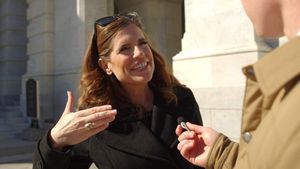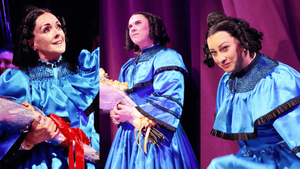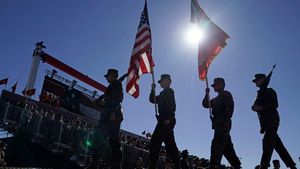CONTACTAbout UsCAREER OPPORTUNITIESADVERTISE WITH USPRIVACY POLICYPRIVACY PREFERENCESTERMS OF USELEGAL NOTICE
© 2025 Equal Entertainment LLC.
All Rights reserved
All Rights reserved
By continuing to use our site, you agree to our Privacy Policy and Terms of Use.
We need your help
Your support makes The Advocate's original LGBTQ+ reporting possible. Become a member today to help us continue this work.
Your support makes The Advocate's original LGBTQ+ reporting possible. Become a member today to help us continue this work.
Eleven years ago I was working as a waiter at Pearl Oyster Bar in the West Village. At the time I was in my late 20s and still living pretty much in the dark when it came to thinking about my retirement or anything to do with issues surrounding aging at all. Growing older seemed a distant reality at best and was certainly not anything I wanted to think about.
Pearl Oyster Bar was counter seating only at the time, which meant I was face-to-face with most customers throughout their lunch or dinner. Needless to say, I became somewhat close with several of the regulars.
One of these regulars was a man named Mel. He was 75 years old at the time. We chatted a lot about time spent in Europe, his experiences as an interior designer, and sometimes he would share stories about what it was like to live in New York as a gay man over the past 50 years. After several conversations Mel asked me to lunch. I said I'd get back to him on that as I had a pretty hectic schedule. Lie. Mel asked again, and then again. I kept putting him off and told my fellow employees that Mel was "on the hunt" and looking for a date.
One day someone called the restaurant and the owner, Rebecca, answered. I had no idea with whom she was speaking, but I could see by the disappointment in her eyes and the way she was staring at me that I was probably in for it. Rebecca put the phone down to her side and gave the beckoning finger wag. I came closer and Rebecca said, in a way only those familiar with Rebecca can comprehend, "This is Mel on the phone! What the hell is your problem?! Why in the hell don't you just meet him for lunch?! What could possibly go wrong?!" and then handed me the phone. Mel must have overheard because when I picked up the phone to speak with him he said to me, "I'm very sorry to call you at work, but I don't have your personal number. Mike, I'm 75 years old. Most of my friends have died due to the AIDS pandemic or moved away. We seem to have a great connection. I'm not looking for a date. I'm only looking for friendship. Please meet me for coffee." To say I was humbled by his words would be an understatement. I accepted his offer.
Our friendship has since grown into something more closely related to family. Through Mel, I met Bill, a social worker specializing in LGBT elder issues. I soon learned that there was a whole generation of men and women out there who had been left behind and forgotten. What amazed me the most was that this was the very same generation of men and women who actively took to the streets in the late '60s, from San Francisco to New York, fighting for our rights. They came out of the closet at a time when they could lose their jobs, family, and friends and even get arrested for doing so. They are the men and women who survived the AIDS crisis, battled government, and built LGBT-friendly communities in major cities across America. The list of their incredible achievements goes on and on. It boggled my mind that so many of our heroes were facing such an onslaught of so many unfair circumstances with so little support and so few resources to turn to. Even our own community seems to have turned a blind eye. Some of the issues Mel and his friends helped me to better understand are:
- LGBT elders are more likely to live alone and without traditional familial support.
- As we grow older we enter a world of services that may not be familiar with LGBT people. Organizations such as SAGE, New Leaf, GLOE, and GRIOT Circle offer some services but only in major cities, and they are not readily available to LGBT elders living in rural areas.
- Without federal protections many LGBT elders retreat back into the closest when entering mainstream facilities due to tolerated, and in some cases encouraged, homophobic attitudes.
- Basic rights such as hospital visitation or the right to die in the same nursing home as one's partner are regularly denied same-sex partners.
- The federal Older Americans Act excludes LGBT elders, leaving us open to discrimination and homophobia in nursing homes, hospitals, community centers and assisted-living facilities.
- Without marriage equality we are more likely to find ourselves in financial trouble if we are coupled and lose a partner because:
- Social Security pays survivor benefits to married widows and widowers, but not to the surviving same-sex life partner of someone who dies, even if they have a state-sanctioned marriage, which is currently not recognized by the federal government.
- Medicaid regulations protect the assets and homes of married spouses when the other spouse enters a nursing home or long-term care facility, not for same-sex partners.
- Tax laws and other regulations of 401(k)s and pensions discriminate against same-sex partners.
After learning about the issues I decided to make a documentary about LGBT elders in the hopes that the film would raise awareness, answer questions, and inspire our community and our allies to stand up and take action. We must pull together as a family just as we did during the AIDS crisis and advocate for LGBT elder rights immediately, not just because they are so desperately needed for our elders right now but because we will all need these essential rights at some point in our lives. My relationship with Mel led me to a better understanding of myself and my community. I have him to thank for helping me see that age is really only a number, and that all of us, regardless of our age, deserve the same respect and support from our own community as well as from the government and society as a whole.
From our Sponsors
Most Popular
Bizarre Epstein files reference to Trump, Putin, and oral sex with ‘Bubba’ draws scrutiny in Congress
November 14 2025 4:08 PM
True
Jeffrey Epstein’s brother says the ‘Bubba’ mentioned in Trump oral sex email is not Bill Clinton
November 16 2025 9:15 AM
True
Watch Now: Pride Today
Latest Stories
Texas expands lawsuits against doctors accused of providing gender-affirming care to youth
December 11 2025 4:36 PM
How Sundance 2026 celebrates its queer legacy
December 11 2025 3:54 PM
George Santos’s exclusive D.C. Christmas party featured famous grifters & MAGA influence peddlers
December 11 2025 3:31 PM
Nancy Mace investigated for bad behavior at airport, blames transgender people
December 11 2025 1:11 PM
Pete Buttigieg mocks Trump Transportation Secretary Sean Duffy’s strange airport pull-up stunt
December 11 2025 1:00 PM
Appeals court mulls upholding ruling that struck down Pentagon’s HIV enlistment ban
December 11 2025 11:51 AM
Florida sues leading medical groups for supporting gender-affirming care
December 11 2025 11:02 AM
Behind Marjorie Taylor Greene's latest push to criminalize gender-affirming care
December 10 2025 9:09 PM
Queer actor Wenne Alton Davis, known for 'Maisel,' 'Normal Heart,' killed in NYC car crash
December 10 2025 5:14 PM
‘Proud’ pro-LGBTQ+ Democrat flips Republican state House seat in Georgia electoral upset
December 10 2025 4:05 PM
Texas city votes to overturn LGBTQ+ antidiscrimination protections
December 10 2025 4:03 PM
Pornhub's spicy stats prove just how horny 2025 was
December 10 2025 3:30 PM
'Heated Rivalry' stars thank WeHo gay bar for 'tweeting about our butts'
December 10 2025 2:55 PM
Egypt and Iran tell FIFA to cancel World Cup Pride Match, calling it 'contrary' to values
December 10 2025 1:05 PM




































































Charlie Kirk DID say stoning gay people was the 'perfect law' — and these other heinous quotes